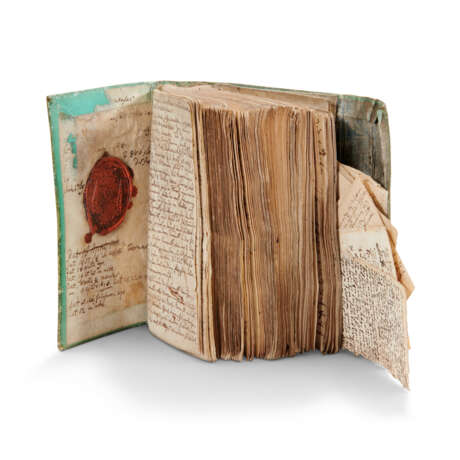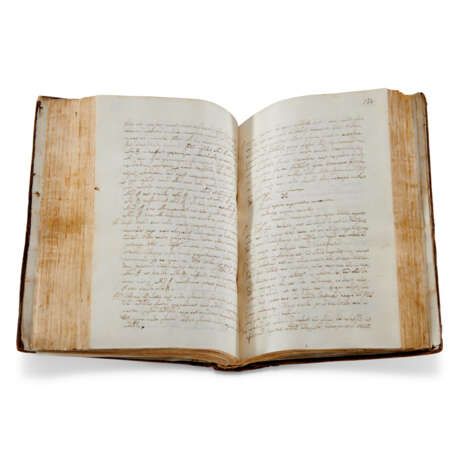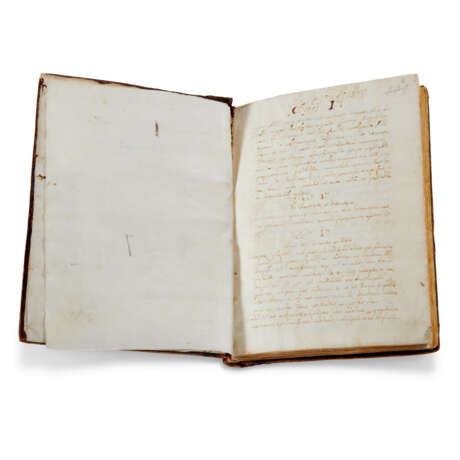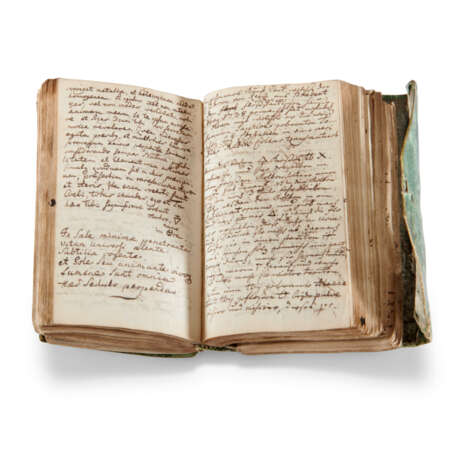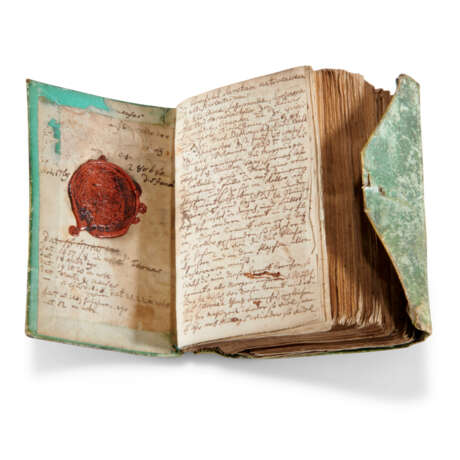ID 1105627
Lot 38 | Anonymous German alchemist
Estimate value
£ 2 000 – 3 000
Alchemical manuscript with recipes, in German and Latin, manuscript on paper [Germany, 18th century]
A working German alchemist's compendium of recipes and notes on the alchemical process and the Philosopher's Stone, with early masonic provenance.
158 x 90mm. 288 leaves + 7 folded recipes in pocket of binding, all written in at least two cramped German 18th-century hands, varying number of lines (first gathering loose, final gatherings attached by a thread, warped and stained). Contemporary green vellum wallet/pocket binding (warped, rubbed and scuffed). Provenance: Various dates added in a German hand to inside upper cover, including 1677 and 1769, alongside an 18th-century red wax seal with various masonic insignia.
Content: The text is a working miscellany of recipes and alchemical processes, including a secret recipe against venereal disease and scurvy ('antivenereum et antiscurbuticum'); various processes of transmutation; various experiments with Phosphorus ('De Phosophoro Experimenta'); a treatise, in German, drawing on the Jewish alchemist Martinus de Delle (also known as Mardochaeus de Nelle', an elusive figure allegedly active at the leading courts of the later 16th century, including those of Elector August in Dresden and Emperor Rudolf II in Prague); a remedy against heart-attacks; a Latin treatise on embalming entitled 'De Balsamatione Corporum', probably drawing on Wedelius' treatise of 1691; instructions on how to make porcelain ('von Porcellein machen'); recipes for balsams, ointments ('balsamo' and 'unguentum') and tinctures, including a 'tinctura particularis cum auro potabili' (a medical recipe for gold tincture also discussed in later centuries by Georg Ernst Stahl, Materia Medica. Das ist: Zubereitung, Krafft und Würckung, Derer sonderlich [...], p.28); instructions on how to resuscitate plants; and various recipes for ailments, including one for an 'unguentum mirabile' using camphor, one against arthritis, and one to cure breast cancer. There is a mention of 'Graf Peikul', or Baron Peikel, a lieutenant-general in the Polish Army who claimed to have discovered the secret of making gold and was executed by order of Charles XII of Sweden in 1707.
[With:] A philosophical disquisition on Porphyry's Isagoge, in Latin, manuscript on paper [Italy, 17th century]. 203 x 148mm. 246 leaves. c.29 lines, modern foliation in pencil (occasional marginal spotting). Contemporary calf gilt (repaired).
The text, entitled 'In Isagoge Porphyrii' seems to be an unpublished commentary on the Greek neoplatonist Porphyry's Introduction to Aristotle's Categories, also known as the Isagoge. The Greek text was translated into Latin by Boethius and was the standard scholastic textbook on logic for at least a millennium after his death. The work included the highly influential hierarchical classification of genera and species from substance in general down to individuals, known as the Tree of Porphyry, and an introduction which mentions the problem of universals. The present text is not Boethius' translation, but that of several contemporary and later writers, including Boethius himself, but also Averroes, Abelard, Scotus, and William of Ockham composed commentaries on Porphyry's text.
| Address of auction |
CHRISTIE'S 8 King Street, St. James's SW1Y 6QT London United Kingdom | ||||
|---|---|---|---|---|---|
| Preview |
| ||||
| Phone | +44 (0)20 7839 9060 | ||||
| Buyer Premium | see on Website | ||||
| Conditions of purchase | Conditions of purchase |
